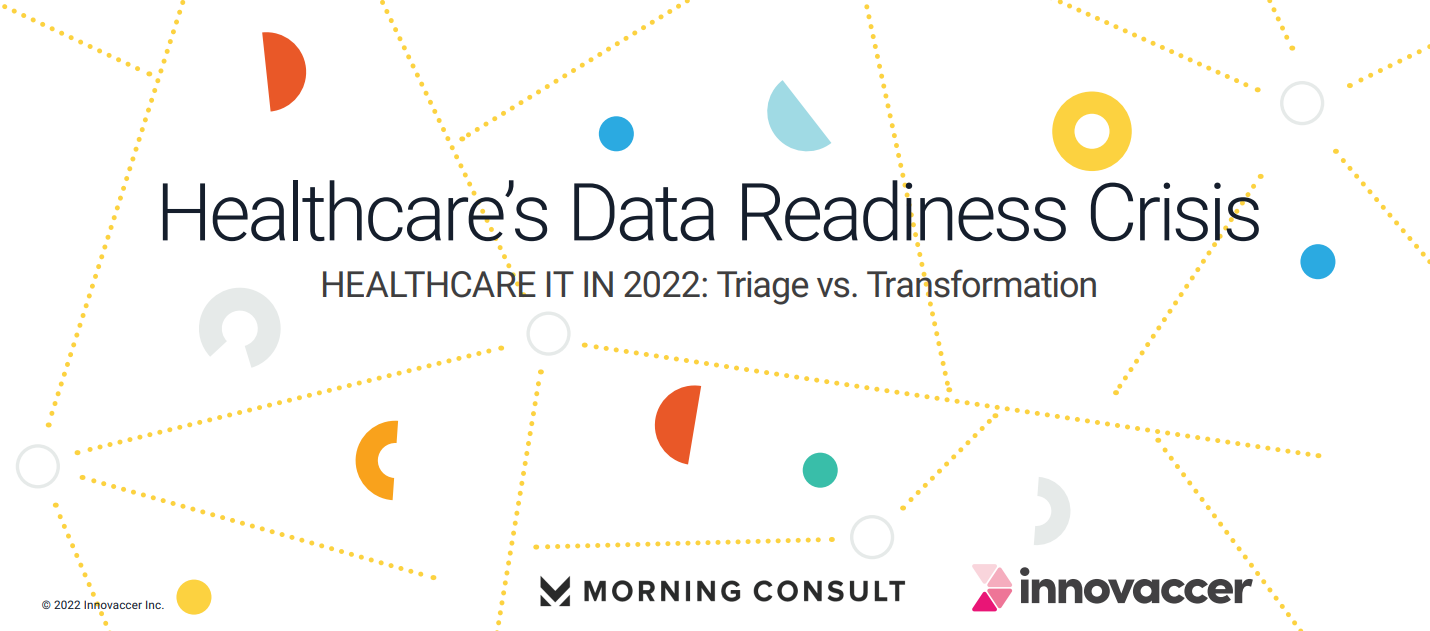
What You Should Know:
– Healthcare leaders have high aspirations for digital transformation, but a lack of data readiness threatens their ability to execute, according to a new research conducted by Morning Consult and commissioned by Innovaccer.
– The 35-page report, “Healthcare’s Data Readiness Crisis: Triage vs. Transformation,” reveals that the overwhelming majority of healthcare executives surveyed (95%) are focused on digital transformation, with 61% aiming to have their organizations achieve full digital transformation in just three to five years—a blink of an eye in healthcare time.
Healthcare Data Readiness Crisis Brewing
There’s a data readiness crisis brewing that threatens to undermine digital transformation, as 97% of healthcare executives surveyed report they’re pushing for more data interoperability. Fully 3 out of 4 surveyed healthcare executives said they need clean, interoperable data that works across every system in the organization. Nearly half (42%) said their organizations’ data is highly fragmented and siloed, 41% cited data interoperability as the top technical barrier stifling innovation, and 58% didn’t believe that their EHR vendor could support their enterprise data strategy.
Closing this data readiness gap is the foundational step required to realize the promise of digital transformation and measurably improve clinical, financial, and operational outcomes. That’s a key reason why many healthcare executives surveyed said they plan to invest in a healthcare data platform that fosters enterprise data readiness and pervasive interoperability. Indeed, the number of healthcare executives who plan to invest in those technologies is projected to jump 440% by 2025—by far the greatest percentage increase across all other categories, including EHRs, cloud migrations, patient portals, and CRM, according to the research.
“All across healthcare, clinical, claims, and other data and the crucial insights it can reveal are literally trapped in hundreds of disconnected systems within each institution,” says Abhinav Shashank, cofounder and CEO of Innovaccer. “And instead of unifying these systems, we keep pouring more money into old technologies and erecting more data silos. It’s time to unify and optimize data across healthcare to make it complete, trustworthy, and actionable. And that requires a shift in our thinking. When we approach digital transformation from the perspective of ‘data readiness first,’ healthcare IT leaders will find they can address their immediate challenges while establishing a foundation for accelerating transformation long term.”
Other digital transformation key findings from the study include:
– Data activation platforms and data lakes hold massive potential for accelerating innovation and driving long-term transformation. Yet they are woefully underfunded and deprioritized compared to other IT initiatives, many of which are legacy and near-term.
– 5% of healthcare executives who invested in data activation platforms or data lakes in 2021.
– 61% are targeting their organizations to achieve full digital transformation in just three to five years.
– 43% hope to achieve their digital transformation goals within three years. Two in five want to achieve digital transformation in two years or less.
– Only 1 in 3 respondents said their AI capabilities were sufficient to support their digital transformation
– The vast majority of respondents said they were deferring investment in AI to sometime in 2025.
– Only about 4 in 10 of the healthcare executives surveyed said they were happy with the role their EHR vendor plays in their enterprise data strategy. The rest either thought their EHR vendor fell short or they weren’t sure
Report Background/Methodology
The Morning Consult study was designed to understand the current and near-term opinions of healthcare executives with respect to digital transformation. Morning Consult surveyed a national sample panel of 75 U.S.-based C-suite, VP, and director-level executives at academic and non-academic health systems and facilities with up to 2,000 beds and revenue from less than $1 billion to over $10 billion. All respondents had decision-making authority, share, or influence on final decisions regarding technology investments for their organizations. Their views reflect a cross-section of healthcare leaders’ views and priorities in 2022.
For more information, click here to download the report.
